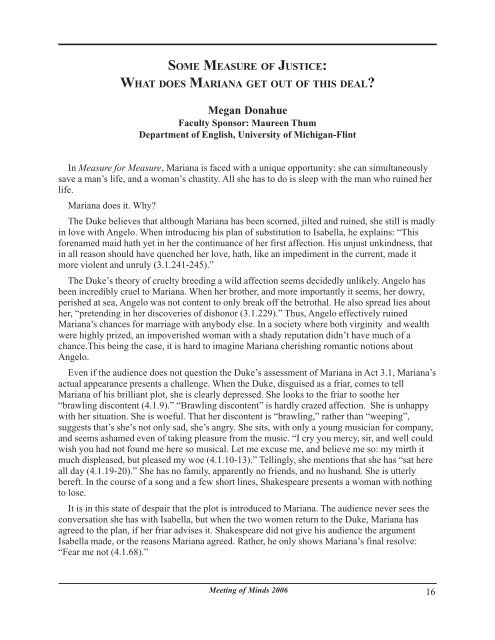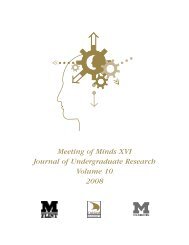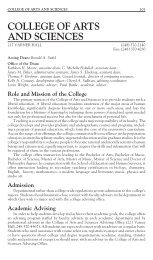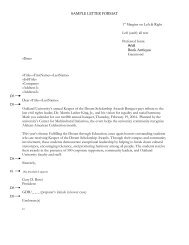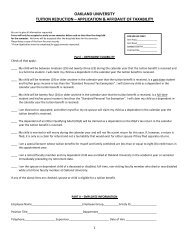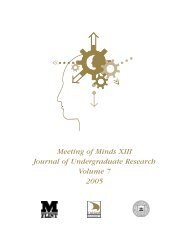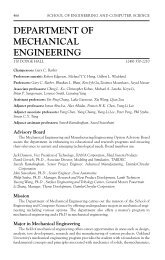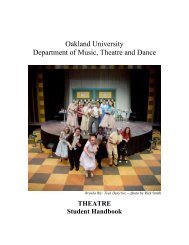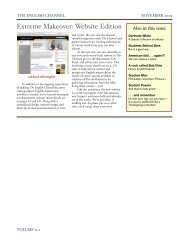MOM 2006 journal for pdf.pmd - University of Michigan-Flint
MOM 2006 journal for pdf.pmd - University of Michigan-Flint
MOM 2006 journal for pdf.pmd - University of Michigan-Flint
You also want an ePaper? Increase the reach of your titles
YUMPU automatically turns print PDFs into web optimized ePapers that Google loves.
SOME MEASURE OF JUSTICE:<br />
WHAT DOES MARIANA GET OUT OF THIS DEAL?<br />
Megan Donahue<br />
Faculty Sponsor: Maureen Thum<br />
Department <strong>of</strong> English, <strong>University</strong> <strong>of</strong> <strong>Michigan</strong>-<strong>Flint</strong><br />
In Measure <strong>for</strong> Measure, Mariana is faced with a unique opportunity: she can simultaneously<br />
save a man’s life, and a woman’s chastity. All she has to do is sleep with the man who ruined her<br />
life.<br />
Mariana does it. Why?<br />
The Duke believes that although Mariana has been scorned, jilted and ruined, she still is madly<br />
in love with Angelo. When introducing his plan <strong>of</strong> substitution to Isabella, he explains: “This<br />
<strong>for</strong>enamed maid hath yet in her the continuance <strong>of</strong> her first affection. His unjust unkindness, that<br />
in all reason should have quenched her love, hath, like an impediment in the current, made it<br />
more violent and unruly (3.1.241-245).”<br />
The Duke’s theory <strong>of</strong> cruelty breeding a wild affection seems decidedly unlikely. Angelo has<br />
been incredibly cruel to Mariana. When her brother, and more importantly it seems, her dowry,<br />
perished at sea, Angelo was not content to only break <strong>of</strong>f the betrothal. He also spread lies about<br />
her, “pretending in her discoveries <strong>of</strong> dishonor (3.1.229).” Thus, Angelo effectively ruined<br />
Mariana’s chances <strong>for</strong> marriage with anybody else. In a society where both virginity and wealth<br />
were highly prized, an impoverished woman with a shady reputation didn’t have much <strong>of</strong> a<br />
chance.This being the case, it is hard to imagine Mariana cherishing romantic notions about<br />
Angelo.<br />
Even if the audience does not question the Duke’s assessment <strong>of</strong> Mariana in Act 3.1, Mariana’s<br />
actual appearance presents a challenge. When the Duke, disguised as a friar, comes to tell<br />
Mariana <strong>of</strong> his brilliant plot, she is clearly depressed. She looks to the friar to soothe her<br />
“brawling discontent (4.1.9).” “Brawling discontent” is hardly crazed affection. She is unhappy<br />
with her situation. She is woeful. That her discontent is “brawling,” rather than “weeping”,<br />
suggests that’s she’s not only sad, she’s angry. She sits, with only a young musician <strong>for</strong> company,<br />
and seems ashamed even <strong>of</strong> taking pleasure from the music. “I cry you mercy, sir, and well could<br />
wish you had not found me here so musical. Let me excuse me, and believe me so: my mirth it<br />
much displeased, but pleased my woe (4.1.10-13).” Tellingly, she mentions that she has “sat here<br />
all day (4.1.19-20).” She has no family, apparently no friends, and no husband. She is utterly<br />
bereft. In the course <strong>of</strong> a song and a few short lines, Shakespeare presents a woman with nothing<br />
to lose.<br />
It is in this state <strong>of</strong> despair that the plot is introduced to Mariana. The audience never sees the<br />
conversation she has with Isabella, but when the two women return to the Duke, Mariana has<br />
agreed to the plan, if her friar advises it. Shakespeare did not give his audience the argument<br />
Isabella made, or the reasons Mariana agreed. Rather, he only shows Mariana’s final resolve:<br />
“Fear me not (4.1.68).”<br />
Meeting <strong>of</strong> Minds <strong>2006</strong><br />
16


